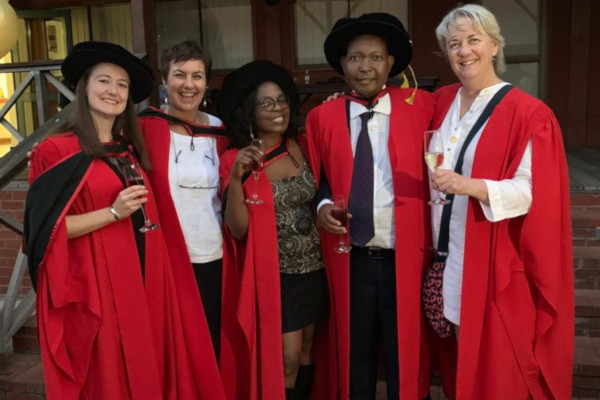
The ELRC is exceptionally proud of our five PhD Graduates for 2019. All of their studies make an important contribution to the field of environmental education research in Southern Africa, addressing education system transformation, transformative learning and ways of enhancing education and training systems in southern Africa. They graduated together with seven Masters researchers on Thursday 11 April 2019.
The citations read for the PhDs at the graduation are included below:
Dr Caroline Bell
One of the major environmental problems facing humanity is ocean degradation. Caroline’s study addresses the much neglected area of upskilling of Marine Science and Management professionals in South Africa. The study provides in-depth understanding of the complex nature of upskilling practices of marine professionals, and shows that there is a need for giving attention to the intersection of learning, specialisation, and sector community building in upskilling practices. Importantly, the study shows that marine environmental conditions themselves significantly shape upskilling processes.
Dr Experencia Jalasi
Approximately 2 million low energy cook stoves have been distributed to communities in Malawi to address climate change challenges. Few have given attention to how this socio-technical innovation aligns with local cultures of cooking practice. Experencia, through a three year transformative learning process, engaged women, NGO distributors and government officials in addressing this issue. The study is a world-first, as it centres on concerns of the rural women who use these stoves. Importantly, it shows their agency for driving change.
Dr Lynette Sibongile Masuku
Too many children in South Africa fail to progress beyond the first years of schooling. With this as central problem, Sibongile investigated local cultures of children, with emphasis on their sophisticated knowledge of cattle. Seeing this as an important medium of cultural expression, she develops a strong argument for post-colonial approaches to teaching and learning in education. Her work provides a leading African study in respecting the knowledge of young children as a foundation for early learning and curriculum development.
Dr Mary Murphy
We are all faced with the complexity of dealing with mixed messages about environmental risk presented via the media. In this study Mary considers the complexity and contradictions in multi-media messages and how they influence our agency for change. Reflecting on her own experiences in addressing conflicting signals embedded in many environmental media texts, she develops a transformative learning approach using the semiotics of storytelling for communicating complex environmental concerns in environmental education. The thesis itself, offers such a story.
Dr Victor Tichaona Pesanayi
African communities have been disconnected from land, and from traditional agro-ecological practices including seed saving and water harvesting. In this study Tichaona recovers African cultures of agriculture. Working generatively with agricultural colleges and farmers in South Africa and Zimbabwe he re-centres the smallholder farmer in agricultural education and learning systems. His expansive, boundary-crossing learning network approach to transformative learning in agricultural learning systems offers a new model for agricultural education and training in Africa with significant theoretical and practical implications.
